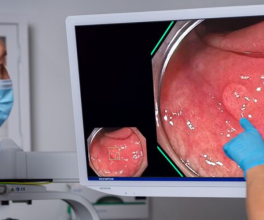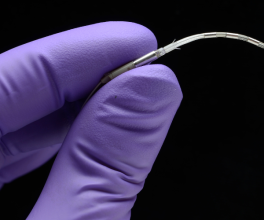
COPD Explained
By: Gilmar Flores, MPH, Senior Manager for Programs and Research at the Emphysema Foundation of America
What is Chronic Obstructive Pulmonary Disease (COPD)?
The Centers for Disease Control and Prevention estimates that approximately 16 million people in the United States suffer from COPD, and millions more are undiagnosed.i COPD is a chronic inflammatory lung disease that obstructs airflow in the lungs. Chronic lower respiratory diseases, including COPD, are the sixth leading cause of death.ii Although COPD cannot be cured, the symptoms can be treated.
COPD is an umbrella term for a group of diseases that causes airflow blockage and breathing problems, including Emphysema, Chronic Bronchitis, and some forms of asthma. Emphysema – one form of COPD – is a disease that progresses over time and involves the gradual damage of lung tissue, specifically destruction of the alveoli (tiny air sacs), resulting in trapped air that can cause over inflation of the lungs, leading to significant breathing challenges. As COPD worsens, people may feel short of breath when doing common daily tasks like making the bed, getting the mail, or even washing their hair. People who suffer from COPD are at increased risk of developing heart disease, lung cancer, and other conditions.
What are the symptoms of COPD?
The symptoms of emphysema are not often recognized until later stages of the disease. What may be confused with “just getting older,” such as shortness of breath or a pause on normal activities, may be symptoms of lung disease. If you experience any of these symptoms or are exposed to various risk factors, you should talk to your doctor. Common symptoms of COPD that lead to a diagnosis include but are not limited to:
- Shortness of breath
- Excess of mucus production
- Wheezing
- Chest tightness
- Coughing
- Tired or lack of energy
- Cyanosis (bluish discoloration of the skin)
- Frequent respiratory infections
What causes COPD?
While smoking is considered the number one cause of emphysema, long-term exposure to airborne irritants, such as air pollution, can cause lung tissue to break down over time.i Genetics can also play a role in raising your risk for emphysema. The main causes can be summarized in the list below:
- Tobacco smoke, including second- and third-hand smoke
- Genetic disease Alpha-1 Antitrypsin Deficiency, a genetic condition where you are missing the proteins in your blood to protect your lungs.
- Chemical and Pollutants (smog, mold, fumes, smoke, work-related materials)
- Lung infections
What are the treatment options for COPD?
Since emphysema causes irreversible damage to the lungs, there is no cure. However, symptoms can be managed, and treatments are available that can improve a person's life, including:
- Quit smoking – the most effective treatment for smokers with COPD. Some helpful options include self-help programs, nicotine replacement therapy, and non-nicotine prescription medications.
- Medications – which can include bronchodilators (to help open narrowed airways), corticosteroids (to lessen inflammation of airway walls), antibiotics (to fight infections) and expectorants (to loosen mucus).
- Oxygen therapy
- Lung surgery
- Minimally invasive procedures like bronchoscopic lung volume reduction with endobronchial valves, including the SpirationTM Valve System. Endobronchial valves are one-way valves that can be inserted into a targeted airway of the damaged lung during a bronchoscopy procedure. The valve is designed to redirect air away from the diseased part of the lung towards the healthier parts, which is intended to help patients breathe easier.*
Staying healthy is also essential. If you have COPD, you can benefit from:
- Good nutrition – eating healthy foods can help keep energy levels high and weight controlled. Drink extra fluids.
- Exercise – exercise helps muscles use oxygen more efficiently.
- Pulmonary Rehabilitation Programs – ask your provider about these programs.
Conclusion
While there is no cure for COPD, early detection and treatment can reduce symptoms, and you can live a healthy and happy life.
“Nothing is more despairing than getting a new diagnosis, feeling alone, and not knowing what to do. The Emphysema Foundation of America provides support to those in need. In our Adult Lung Health Workshops, we spend quality time explaining how COPD affects the lungs and participants come to understand the importance of following their medication and seeking new treatment options, so you can thrive in life, even with a chronic condition.”
The Emphysema Foundation of America (EFA) and Olympus Corporation of the Americas have partnered to provide a virtual lung health education series on COPD. You can view the recording of the workshop about bronchoscopic lung volume reduction as a treatment for severe emphysema with Gerard Criner, MD, Professor and Founding Chair of the Department of Thoracic Medicine and Surgery at the Lewis Katz School of Medicine, Temple University, here:
Follow the Emphysema Foundation of America and the Spiration™ Valve System Facebook pages to learn more about how to gain a better quality of life while living with chronic lung disease.
*Potential complications which may be associated with the use of the Spiration™ Valve System may include, but are not limited to, pneumothorax, worsening of COPD symptoms, pneumonia, and dyspnea. Prior to using the Spiration™ Valve System, please review the full list of prescriptive information at spirationvalve.com/potential-risks-complications for additional information on indications, contraindications, warnings, precautions and potential complications.
i Centers for Disease Control. Chronic Obstructive Pulmonary Disease: Basics About COPD. https://www.cdc.gov/dotw/copd/index.html. Accessed December 3, 2018.
ii Centers for Disease Control and Prevention, National Center for Health Statistics. National Vital Statistics System, Mortality 1999-2020 on CDC WONDER Online Database, released in 2021. Data are from the Multiple Cause of Death Files, 1999-2020, as compiled from data provided by the 57 vital statistics jurisdictions through the Vital Statistics Cooperative Program. Accessed at http://wonder.cdc.gov/ucd-icd10.html on Jul 21, 2022 2:05:19 PM





